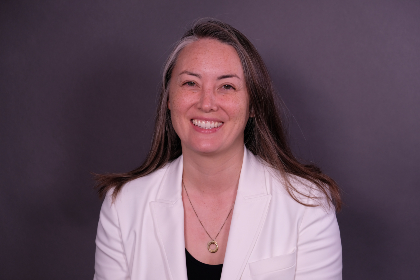Katharine Cheung, M.D., Ph.D., assistant professor of medicine, assumed the role of Interim Director of the Center on Aging, effective September 1. A geriatric and palliative nephrologist, Cheung served on the center’s advisory board from 2017-2023. As interim director, Cheung's top priorities include relaunching pilot grants for faculty who are interested in pursuing research focused on gerontology or geriatric issues.

Katharine Cheung, M.D., Ph.D., serves as Interim Director of the Center on Aging.
Katharine L. Cheung, M.D., Ph.D., assistant professor of medicine, assumed the role of Interim Director of the UVM Center on Aging at the Larner College of Medicine, effective September 1, 2023. A geriatric and palliative nephrologist, Cheung served on the Center on Aging faculty advisory board for six years before stepping into the directorship role. She succeeds Michael LaMantia, M.D., M.P.H., associate professor of medicine and division chief for geriatric medicine, who served as the Center on Aging director from 2017-2023.
Cheung came to UVM in 2013 as a postdoctoral associate, following her medical residency at Stanford University School of Medicine. She worked with Larner College of Medicine researchers on a longitudinal study, the Women’s Health Initiative, investigating the association of kidney disease and vasomotor symptoms. She joined the UVM faculty in 2017 and completed her Ph.D. the following year. In 2020 she was recognized as the UVM Health Network Medical Group’s Dean’s Excellence in Research Junior Investigator of the Year.
Cheung is actively engaged in clinical practice, community service, and research focused on the care of older adults with advanced kidney disease and cognitive impairment. Alzheimer’s disease and related dementias affect up to 48 percent of people living with kidney disease, and often go unnoticed. As an investigator in the Vermont Conversation Lab, Cheung uses human coding and artificial intelligence to detect cognitive impairment in palliative care conversations with dialysis patients.
Her longer-term goals include investigating how to best elicit engagement in serious illness conversations for patients with cognitive impairment, as well as determining “whether and how patients with cognitive impairment ought to have these conversations,” Cheung explained.
“Dementia can impact a person’s ability to learn about their diagnosis, weigh risks and benefits of treatment options, and navigate the health care system,” she said. “This is so topical now, in Vermont and across the nation. The numbers of older people and those with dementia are rising, and older adults don’t just have one medical problem, they have multiple medical problems—kidney disease, cancer, liver issues, stroke. They need clinicians to help them balance trade-offs and make decisions.”
In her new role with the Center on Aging, Cheung looks forward to connecting with colleagues across the UVM campus whose work focuses on older people and aging. One of her top priorities is to relaunch the center’s pilot grants initiative for UVM faculty who are interested in pursuing research focused on gerontology or geriatric issues.
“I imagine there are a lot of people out there whose work in education or research is focused on aging, but they aren’t part of the center yet. As interim director, I have more opportunities to reach out and bring them into the fold, and to have more diverse voices,” she said.
Cheung also anticipates working with community partners to shape policy and inform decisions related to aging issues, health care, and human services. The center collaborates with the UVM Health Network, Vermont Department of Health, Department of Disability, Aging and Independent Living, the Governor’s Commission on Alzheimer’s Disease and Related Dementias, and the Tri-State Learning Collaboration on Aging.
“I see the Center on Aging as a hub for collaboration. We want to learn about the values and priorities of the community we are serving. We also want to take what we learn and what we teach through our programs to inform policy at the state level.”
One issue of concern is the workforce shortage in Vermont as it pertains to the needs of older people, especially those with dementia, and their caregivers. The center collaborates with the Memory Program at UVM Medical Center on a pilot program that places graduate students in social work internships serving older Vermonters with dementia.
“We have had early success, with participants choosing careers working with older people in Vermont. It’s a great example of how the center collaborates across dementia family care and other colleges in addition to Larner,” said Cheung. “I’d like to see more ideas like this going forward.”
Center faculty help guide efforts that led UVM to achieve designation as an “Age-Friendly University,” joining a network of higher education institutions committed to promoting positive and healthy aging through teaching, research, and community engagement. As part of these efforts, the center is preparing for a campus-wide survey of aging-related work and activities. “It’s a feather in the cap for the center to have achieved this designation, and we’re looking at this as a way of structuring the priorities of the center,” Cheung said.
Community education initiatives at the Center on Aging also include annual conferences for geriatric health care professionals and a Gerontology Symposium for community members and caregivers. A Grand Friends program matches UVM students with older adult volunteers to foster intergenerational learning, reduce ageism, and boost the psychological, physical, and social well-being of older and younger people.
Cheung mentors medical students, graduate students, and fellows interested in nephrology, geriatrics, communication sciences, and palliative care. She serves the American Society of Nephrology as a Kidney STARS mentor for students, residents, and fellows. She is a past president of the Vermont Kidney Association.
Cheung’s research is supported by the Northern New England Clinical and Translational Research Network and Vermont Center for Cardiovascular and Brain Health, where she serves as a project director investigating vascular mechanisms of cognitive impairment in kidney disease.
Learn more about The Center on Aging at UVM.